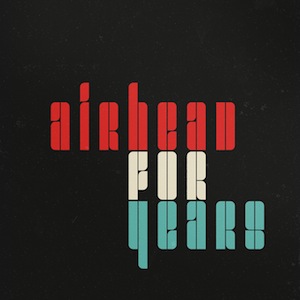Airhead For Years
“Regular James Blake collaborator” should explain everything one might need to know about Airhead‘s musical […]

“Regular James Blake collaborator” should explain everything one might need to know about Airhead‘s musical background—should, but doesn’t. As much as their careers might be intertwined (the two collaborated as far back as 2010’s smoothed-out glitch cut “Pembroke”), and as tight as their association might be, the 2012 singles leading up to Airhead’s first full-length album revealed that he was more than capable of stepping out from Blake’s shadow. The downside was that he delivered a handful of songs that still seemed like the products of a feeling-out process, an indecisive all-directions agenda that left listeners unsure of not only his next move but his current one. Was he edging towards a bare, ambient minimalism? A sunny patch of folk-guitar indie crossover? Some jittery update of IDM-injected technical dubstep? That unpredictability had some promise hidden away in there somewhere, but without a signature sound, the emerging artist remained a bit difficult to grasp. As it turns out, the release of For Years hasn’t made that speculation any easier.
In collecting the a-sides from both of his 2012 singles and propping them up with another half-hour’s worth of songs, Airhead’s debut full-length only makes that stylistic restlessness more frustrating. Of those two singles, “Pyramid Lake” still sounds the most exciting; it’s a swooping, sinister dubstep cut punctuated by King Tubby-style drum drops, pitched-up hiccupy wails, and an increasingly agitated synth arpeggio that sounds like an anxious escapee from Wiley’s sound library. But it’s “Wait,” the earlier single that rode on mellow pastoral indie vibes to inert effect, which opens the LP. And while that sleepy-eyed, slow-motion drift doesn’t dictate the exact style of the music, it definitely carries through as far as a low-impact quietude is concerned.
That said, it does work every so often. “Milkola Bottle” has a deep, melodic melancholy to it that rustles through the backbeat, buffeted around by heavy kicks and submerged under fluttery tones that maintain its forward motion. “Lightmeters” takes that tack from a different angle—it’s the rhythm that feels mournful, as creaking joints and straining belt drives hold its shuffling, snare-heavy 2-step groove together through a soupy haze of subtly distorted indie-pop orchestration. But once the percussive energy level moves a tick or two lower, things practically dissolve into static. Ambient excursions like “Masami” and “Knives” feel more like interludes than songs, as though they’re placeholders for actual ideas that might arrive later. And when “Azure Race” builds its aimless wow-and-flutter ooze into an actual crescendo, it results in an unwelcome surprise: cocktail-lounge trip-hop.
On the other hand, the album does at least present a couple of more interesting detours that Airhead might feel inclined to take in the future. “Faultline” smartly takes the more appealing bits of his ambient leanings—the abstract vocal snippets, the windswept acoustics, the sharp piano notes—and uses them to segue in and out of an insistent 4/4 that brings back striking memories of classic ambient techno. And while “Callow” follows the precedent of the indie-skewing “Wait” in integrating alt-pop vocals and gentle melodies, it does so in a way that builds around a prominent backbeat and has a vivid physicality winding its way through the twinkling chimes. If the place where most of this sound might be headed still seems elusive, we should just point Airhead towards the dancefloor—he seems to have that place figured out pretty well.

